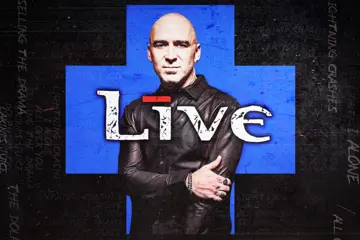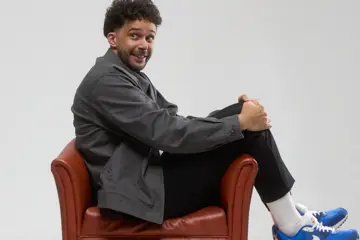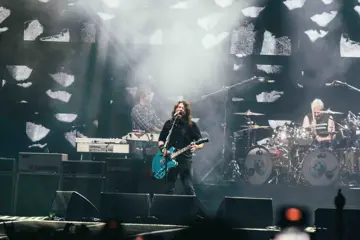Dot Hacker aren't necessarily a supergroup. They're definitely not your average band, though. Frontman Josh Klinghoffer replaced John Frusciante in Red Hot Chili Peppers. He's previously collaborated with Warpaint, Sparks and PJ Harvey (among others). Guitarist Clint Walsh and drummer Eric Gardner previously played in Gnarls Barkley's touring line-up. Bassist Jonathan Hischke is also the bassist for Zach Hill's Hella.
“The inspiration for it was always friendship. I think for me – and for all the guys in the band, really, but especially for me – that's something that I always dreamed of having,” Klinghoffer says. “You know, just a band of your friends where you're all working together towards the same goal. But, at the heart of Dot Hacker, that's where it comes from, I think. To tour and trip around and make music with people you really enjoy.”
This could explain why it took them over three years to get around to releasing an album. To be clear, that's release – not write or record. The band managed to fully assemble their debut album Inhibition in 2009. However, it wasn't released until 2012. Klinghoffer was asked to join the Red Hot Chili Peppers in 2009. Unfortunately for Dot Hacker, he'd spend his next three years touring, writing and recording with the platinum-selling group.
“The band was formed before I joined the Chili Peppers. At the time, it was definitely something all four of us wanted to focus on and give our all to,” Klinghoffer says. “We set ourselves a goal that we wanted to make a record. So, we did – but it just kind of sat there for a while. The record could very well have died or gone unreleased before we had time to do anything with it.
Don't miss a beat with our FREE daily newsletter
“We got lucky, though. A very good friend of mine, Steve McDonald, played the record for his friend Jeff Bower who runs a small label called ORG Music – and he really liked it. So, we went to him and told him we were really proud of it and basically asked if they'd be interested in releasing an album from a band without a tour. They said they'd love that – which was a blessing, because it gave the record and the band an existence.”
The band have only just managed to make it onto the road recently. They've just toured with Cedric Bixler-Zavala's post-The Mars Volta group Zavalaz. It's been an interesting experience for the quartet. They're effectively doing things backwards. They're journeyman musicians and they've just released their debut album. They've collectively played countless live shows for world-class musicians – but they haven't figured out how to tour.
“When we started this tour, it felt like our legs were asleep or something. I have to constantly remind myself that there's a lot of chemistry to be built up,” Klinghoffer says – the band having only played ten shows total before their album was released. “When we play together and do three weeks of writing and rehearsing and whatever, there's no outside pressure. The chemistry comes instantaneously.
“You know, we immediately remember why we like playing with each other. Doing it live is a whole other thing. There's a whole new set of parameters you're still getting used to. It definitely felt, for the first couple of shows, we needed to wake up or something. By the last five shows, everything was happening as it should be. And then, of course, the tour is over.”
Even just performing the album is an awkward experience for the band. It's been four years since they initially wrote Inhibition. Klinghoffer's hoping to put the finishing touches on their second album by the end of the year. Yet, the band are only just releasing their debut in Australia – a debut with all of the mistakes and differences of a young band. Klinghoffer admits he sometimes finds it difficult to listen back to the album.
“I still like it. I still like most of the songs. I still enjoy playing them. Mostly what I didn't like was my vocals,” he laughs. “It's been a long, slow process for me to be comfortable writing lyrics and singing them to people. There's still a part of my personality that thinks that's embarrassing. So, since I was a kid, I've always recorded things and gone out of my way to obscure the vocals.
“So, to me, when I listen to the album, I can still hear the dissatisfaction I have with myself,” he says. “But that was the point of doing it, finishing it and getting it out there. You know, we all have to start somewhere. But, yeah, there was a lot of time for me to listen to that album and grow dissatisfied and disinterested with it – but I finished it in 2009, we mastered it and we always treated that as the finished product. No going back to it.”
It's created an exciting environment for fans, though. Dot Hacker's album is one of potential. They're incredibly accomplished and gifted musicians only beginning to explore their unique chemistry. The album's weird blend of mainstream pop-rock hooks and jagged art/prog-rock influence is only their initial draft. With another record due this year, fans will get the benefit of nearly four years of growth in a one-year album cycle.
“We've just finished a little two-week tour and we're fifty per cent through our second album. We've recorded a good number of songs and I just need to sing on them. Life in Dot Hacker is good,” Klinghoffer says. “I absolutely want it out this year. I'm hoping for as soon as October. I'll have been working pretty diligently throughout July and August. I want to get it finished by August. It's definitely coming out this year, though. Or my name is mud.
“You know, the first one was written and recorded in '09 and released last year – or this year, for Australia. If we manage to get this album out by the end of the year, we'll be a record-a-year band – which would be amazing to carry on if we could,” Klinghoffer says. “Just crank out one every year. That'd be amazing for a band that doesn't get to play together all that often.
“It's funny when people call us art-rock or whatever – because I would like be way more arty and brazen with the sounds,” the guitarist laughs. “Totally irreverent with the writing, you know? But, there's a much more practical part of me that tells me to keep it grounded in a pretty pop world. I don't know, I sometimes worry that things are too rocky and boring with us – so to be called art-rock is a relief. Maybe we're boring art-rock, though, who knows?”















